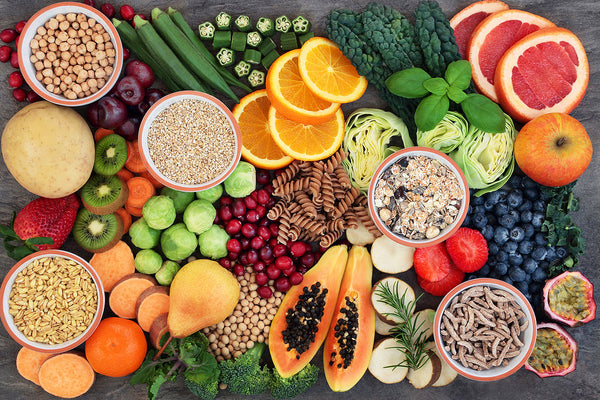For much of the past three decades, carbohydrates have been considered an enemy of weight loss and healthy eating. But the truth is, not all carbs are created equal, nor will they, by definition, hinder weight loss or healthy eating.
In fact, there are numerous healthy carbs that support your health and well-being, and can actually help you to stay on track with your nutrition plan and transformation challenge.
Here are nine reasons why you don't need to fear healthy carbs.
Why You Don’t Need to Fear Healthy Carbs
#1 Carbs are a Vital Source of Energy
Carbohydrates are one of the three macronutrients (alongside protein and fat) that our bodies rely on to function optimally. Carbohydrates serve as our body’s primary energy source, supplying fuel for our muscles, brain and organs.
While many keto and low-carb advocates profess the idea that carbs are “not essential” the simple truth of the matter is that for most people carbohydrates (even a relatively small amount of them) can do wonders to improve energy for the body and mind.
#2 Carbs Fuel Your Brain
The brain consumes about 20% of the body’s energy each day. Carbohydrates (glucose) provide the most readily accessible fuel for the brain. In fact, research has that, compared to lower-fat diets, low-carb diets lead to lower mood and cognitive function.[1,2]
Now this isn’t to say that some individuals perform better on low-carb diets compared to higher carb diets, but the value of carbohydrates (especially healthy carbohydrates, such as whole grains, fruits, and veggies) for cognitive function and mood can’t be overlooked.
#3 Carbs are Important for Exercise Performance
Going back to point #1, carbohydrates are critical for exercise, especially intense training sessions like resistance training, circuit training, and HIIT.
The reason for this is that carbohydrates are the preferred source of energy for our muscles during physically-demanding exercise. Fats are more of a “slow burning” energy while carbs deliver the “high octane” your body needs to be explosive, powerful, and strong.
This is why elite athletes around the world consume carbohydrates before, during, and after training and competition. Specifically regarding post workout, carbs accelerate recovery and halt muscle breakdown by replenishing glycogen stores and lowering cortisol levels. And, the faster you recover, the more frequently you can hit the gym so that you get results faster.
#4 Healthy Carbs Can Help with Weight Loss
Contrary to popular belief, carbohydrates do not make you fat. Only an excess of calories (coupled with a lack of strenuous exercise) will cause you to gain body fat. In fact, healthy carbs can actually help you to lose weight.
Fiber-rich carbs, such as whole grains, fruits, vegetables, nuts, seeds, and legumes, can help you feel full and satisfied, thereby making it less likely that you’ll snack between meals or eat too many calories. Moreover, research confirms the weight loss benefits of a fiber-rich diet.[3]
#5 Carbs are Important for Digestive Health
Fiber is a type of carbohydrate that is important for digestive health as it serves as food for the good bacteria (probiotics) that live in your gut. Soluble fiber, in particular, helps to keep things moving through your GI tract, and consuming adequate daily fiber has been shown to reduce the risk of constipation and other digestive problems.[4]
Researchers specifically highlight the benefits of pectin (found in apples) as well as psyllium husk (found in 1UP Fiber Plus) as being especially beneficial for digestive health and regularity.
#6 Carbs Can Help Reduce the Risk of Chronic Diseases
Diets rich in whole grains, fruits, vegetables, seeds, nuts, and legumes are linked with cardiometabolic health and a reduced risk of chronic diseases, such as heart disease, diabetes, and obesity.[5,6]
Fruits and vegetables, in particular, are rich in vitamins, minerals, and polyphenols that help combat oxidative stress, neutralize toxins, and support immune function.
#7 Carbs Can Help Boost Your Mood
Carbs can help boost your mood, promote relaxation, and reduce feelings of stress and anxiety. The reason for this lies in carbohydrates' ability to enhance serotonin levels. This happens, in part, due to the release of insulin and the decrease in plasma levels of certain amino acids that compete with tryptophan -- the amino acid used to produce serotonin.[7]
As we’ve mentioned a couple of times, it’s important to consume the right types of carbohydrates. Consuming highly refined carbohydrates can lead to energy spikes and increased mood, but those last very briefly, ultimately leaving you feeling hangry.
#8 Carbs Have Been Eaten for a LONG Time Fueled Human Evolution
Many of the paleo and primal eating pundits promote the idea that carbs shouldn’t be eaten (or at least severely restricted) since humans, as a species, haven’t been consuming them very long. However, new research refutes this idea.[8]
Recent biological research has revealed that early humans developed additional copies of the amylase gene. Amylase is the enzyme that enables the body to break down starchy carbohydrates like potatoes, rice, and legumes.
In fact, these adaptations were noted to occur before farming practices were adopted many centuries ago. Today, the average individual may possess as many as 18 copies of the amylase gene, which serves as a marker of how we have evolved to digest carbohydrates.
#9 Healthy Carbs are Delicious!
There’s no way to put it -- carbohydrates are delicious!
So many of us that are results-oriented tend to only think of food as fuel, but it is so much more than that. Eating has social, emotional, and psychological effects too.
It’s meant to be savored, shared, and contemplated, not just shoveled down in the pursuit of lifting more and looking better.
Without carbs, meals can be less satisfying or feel less indulgent. Think about some of nature’s greatest healthy carbs -- sweet potatoes, berries, rice, oatmeal, bananas, pineapple, etc.
These foods are not only nutritious, they’re also delicious! So, don't be afraid to experiment with and enjoy nature’s bounty of healthy carbs.
The Bottom Line on Why You Don’t Need to Fear Carbs
Carbohydrates provide a valuable source of energy to boost exercise performance, enhance cognitive function, boost mood, promote digestive health, and support weight loss. Humans have consumed them for centuries and will continue to do so in the centuries to come.
From a weight loss standpoint, carbohydrates will not inherently cause you to plateau or gain fat. Consuming too many calories causes weight loss plateaus. If you think carbohydrates are the cause of your overindulgence, then it may be helpful to re-evaluate which carbohydrates you’re eating.
Your focus should be healthy carbs (fruits, veggies, whole grains, etc.) while limiting processed and refined carbs that are low in nutrients and high in calories. Simple sugars and other fast carbs can be beneficial during intense workouts and in the post-workout window as they help to halt catabolism and replenish muscle glycogen, but outside of your exercise window, look to complex carbs.
And, if you need help tracking how many carbs you’re eating throughout the day or want some help figuring out how many carbs to eat to lose weight (or build muscle), then download the 1UP Fitness App, where we provide customized nutrition and training programs based on your goals!
References
- D'Anci KE, Watts KL, Kanarek RB, Taylor HA. Low-carbohydrate weight-loss diets. Effects on cognition and mood. Appetite. 2009 Feb;52(1):96-103. doi: 10.1016/j.appet.2008.08.009. Epub 2008 Aug 29. PMID: 18804129.
- Brinkworth GD, Buckley JD, Noakes M, Clifton PM, Wilson CJ. Long-term effects of a very low-carbohydrate diet and a low-fat diet on mood and cognitive function. Arch Intern Med. 2009 Nov 9;169(20):1873-80. doi: 10.1001/archinternmed.2009.329. PMID: 19901139.
- Miketinas DC, Bray GA, Beyl RA, Ryan DH, Sacks FM, Champagne CM. Fiber Intake Predicts Weight Loss and Dietary Adherence in Adults Consuming Calorie-Restricted Diets: The POUNDS Lost (Preventing Overweight Using Novel Dietary Strategies) Study. J Nutr. 2019 Oct 1;149(10):1742-1748. doi: 10.1093/jn/nxz117. PMID: 31174214; PMCID: PMC6768815.
- Gill SK, Rossi M, Bajka B, Whelan K. Dietary fibre in gastrointestinal health and disease. Nat Rev Gastroenterol Hepatol. 2021 Feb;18(2):101-116. doi: 10.1038/s41575-020-00375-4. Epub 2020 Nov 18. PMID: 33208922.
- Aune D, Giovannucci E, Boffetta P, Fadnes LT, Keum N, Norat T, Greenwood DC, Riboli E, Vatten LJ, Tonstad S. Fruit and vegetable intake and the risk of cardiovascular disease, total cancer and all-cause mortality-a systematic review and dose-response meta-analysis of prospective studies. Int J Epidemiol. 2017 Jun 1;46(3):1029-1056. doi: 10.1093/ije/dyw319. PMID: 28338764; PMCID: PMC5837313.
- Arnesen EK, Thorisdottir B, Bärebring L, Söderlund F, Nwaru BI, Spielau U, Dierkes J, Ramel A, Lamberg-Allardt C, Åkesson A. Nuts and seeds consumption and risk of cardiovascular disease, type 2 diabetes and their risk factors: a systematic review and meta-analysis. Food Nutr Res. 2023 Feb 14;67. doi: 10.29219/fnr.v67.8961. PMID: 36816545; PMCID: PMC9930735.
- Wurtman RJ, Wurtman JJ. Do carbohydrates affect food intake via neurotransmitter activity? Appetite. 1988;11 Suppl 1:42-7. PMID: 2903717.
- Danielle Carpenter, Sugandha Dhar, Laura M. Mitchell, Beiyuan Fu, Jess Tyson, Nzar A.A. Shwan, Fengtang Yang, Mark G. Thomas, John A.L. Armour, Obesity, starch digestion and amylase: association between copy number variants at human salivary (AMY1) and pancreatic (AMY2) amylase genes, Human Molecular Genetics, Volume 24, Issue 12, 15 June 2015, Pages 3472–3480, https://doi.org/10.1093/hmg/ddv098






